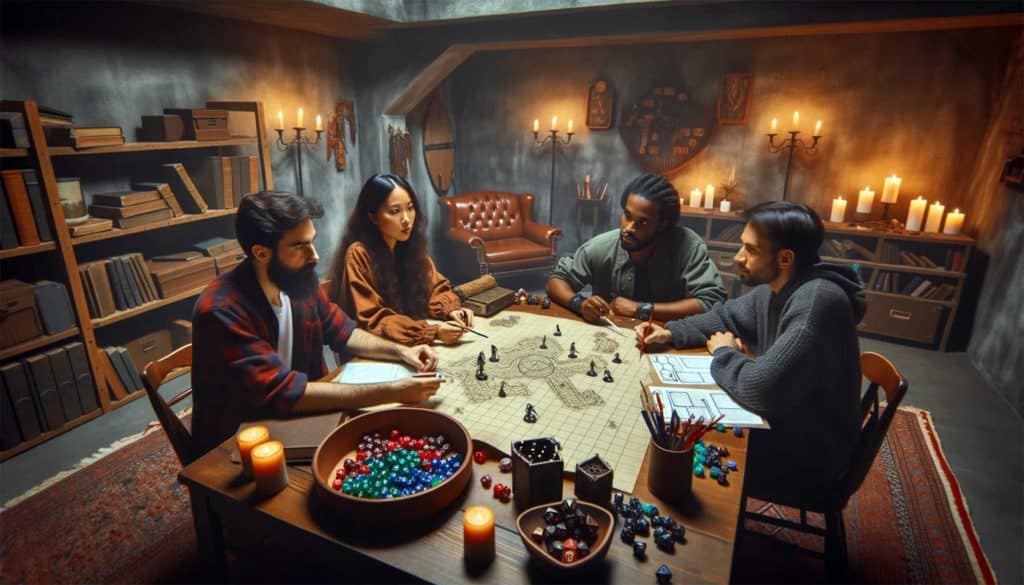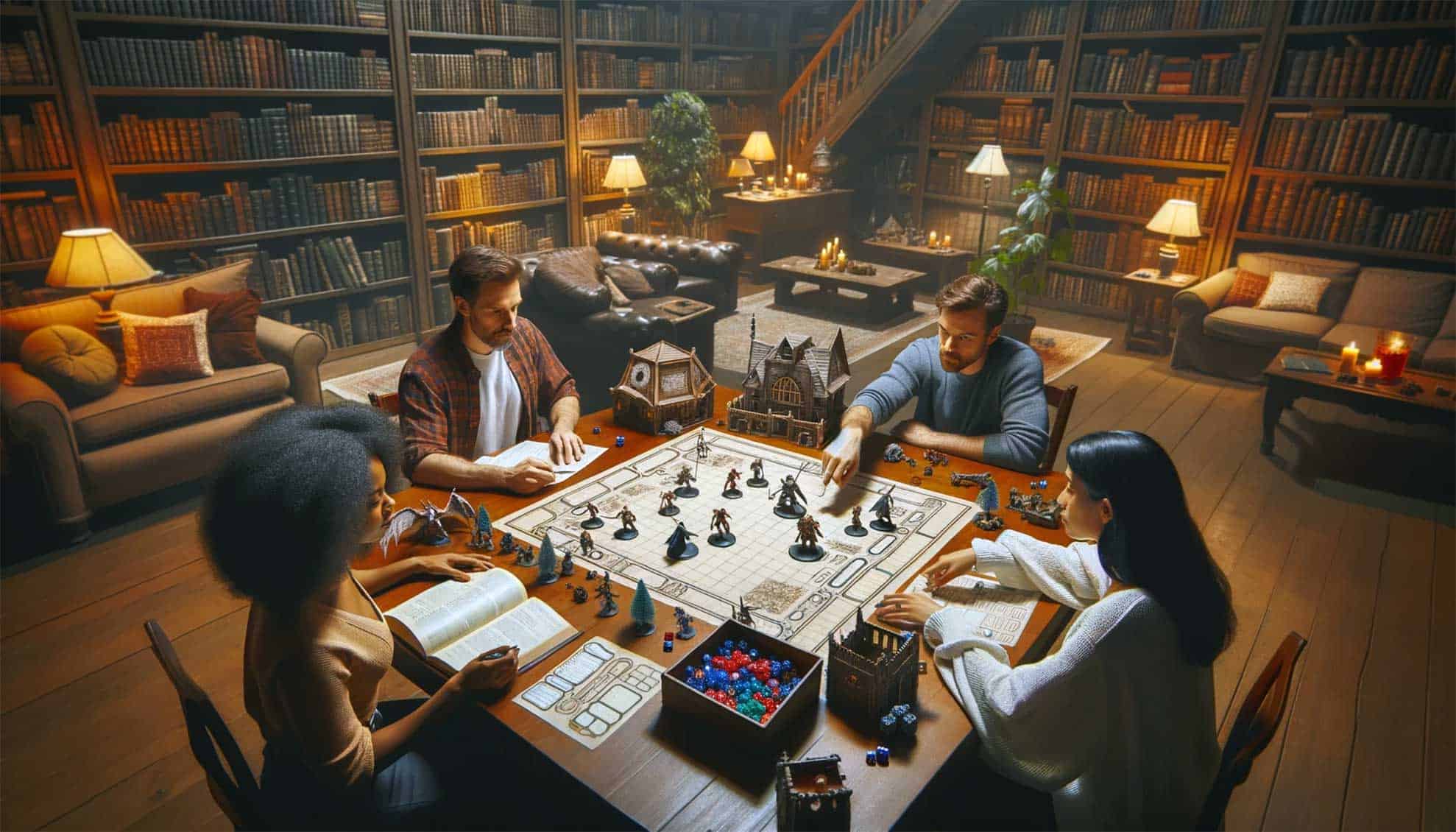For many, the clattering sound of polyhedral dice on a wooden table, the eager anticipation of a roll’s outcome, and the intricate character sheets might define Dungeons & Dragons (D&D). But to pigeonhole this rich experience as merely a game of numbers and chance is to overlook its profound narrative heart. At its core, D&D is a grand tapestry of storytelling, an odyssey embarked upon not just by a single bard, but a collective of imaginative souls. Through its nuanced mechanics and boundless realms, D&D revives an ancient tradition of communal narrative, wrapping players in tales as old as time yet as fresh as each new session.
D&D’s essence is reminiscent of ancient campfires, where shadows danced and stories were spun, passing down legends, morals, and the shared wisdom of generations. Much like those tales told under starry skies, D&D sessions are fluid, dynamic, and shaped by their tellers. Every player, every Dungeon Master, brings forth a piece of themselves, a fragment of their imagination, weaving it seamlessly into the narrative fabric. The game, in this light, becomes less about winning or losing and more about creating, experiencing, and sharing.
However, D&D does more than merely echo the oral traditions of yore. It infuses them with modern sensibilities, dilemmas, and dreams. The worlds created at the game table reflect our realities, our hopes, and our fears. They confront us with moral quandaries, challenge our perceptions, and allow us to explore alternative identities, all within the safe confines of the gaming table. In essence, D&D becomes a playground for both escapism and introspection, a rare combination in modern entertainment.
In the decades since its inception, D&D has evolved, adapted, and expanded. Yet, its narrative soul remains undiminished. It stands as a testament to the enduring power of storytelling, proving that even in an age of cutting-edge graphics and immersive virtual realities, there’s an unmatched magic in gathering around a table, looking into the eyes of fellow adventurers, and embarking on a journey spun from words and boundless imagination.
The Oral Tradition Revived:
Long before written language etched humanity’s thoughts into stone, parchment, or paper, stories flowed through the spoken word. These tales, whispered from one generation to the next, formed the backbone of cultures, immortalized heroes, and gave birth to myths and legends that still echo today. This ancient method of imparting wisdom, entertainment, and moral lessons—the oral tradition—was the primal essence of storytelling, where narrative flourished in its purest form.
Historically, storytelling was not just an act but a revered art. From the tribal shamans recounting the deeds of ancestral spirits to the Greek bards like Homer, whose epics were sung rather than read, oral narratives shaped societies. They were the means by which history was recorded, values were instilled, and identities were forged. These tales, malleable in nature, evolved with each telling, adapting to their audience, absorbing nuances from each storyteller, yet retaining their core essence. They were organic, alive, and deeply personal.
Try my AI Tabletop RPG generators...and an extensive library of content!
Enter Dungeons & Dragons, a game steeped in mechanics and rules, yet at its heart, it is a celebration of the oral tradition. The Dungeon Master assumes the role of the ancient storyteller, crafting worlds and narratives, while players become active participants, shaping the story with their decisions, actions, and interactions. Just as ancient tales morphed with each telling, no two D&D sessions are ever truly identical. The game’s fluidity pays homage to the dynamic nature of oral narratives. And like those ancestral tales that resonated with personal experiences and current events, D&D stories often mirror the collective consciousness, challenges, and aspirations of its players.
Moreover, the ephemeral nature of D&D sessions—where stories unfold in real-time and are subject to the vagaries of memory, interpretation, and dice rolls—echoes the transient beauty of oral traditions. While campaign logs, session recordings, and digital platforms might capture moments, the true magic lies in the experience, in the shared glances, the collective gasps, and the camaraderie forged in fictional fires. Through D&D, the ancient ritual of gathering and storytelling is not just remembered; it is relived, rekindled, and revered.

Characters with Depth:
In the labyrinthine worlds of Dungeons & Dragons, characters are more than mere avatars with a set of statistics. They become living, breathing entities with hopes, fears, ambitions, and flaws. These fictional personas, often dismissed as mere figments of imagination, are a profound exploration of the human psyche, offering insights into our deepest desires, our vulnerabilities, and our potential for growth. Through the act of role-playing, players tap into facets of themselves that might remain otherwise unexplored, adopting alter egos that can be both a reflection and a divergence from their real-world selves.
The psychology behind role-playing is both fascinating and intricate. When a player adopts an alter ego, they aren’t just donning a new identity; they’re navigating the intricate dance between their true self and their character’s persona. This duality can be therapeutic, allowing players to explore suppressed emotions, confront personal challenges, or even rehearse real-world scenarios in the safety of a fictional environment. For many, role-playing becomes a journey of self-discovery, where the boundaries between the player and the character blur, leading to profound moments of introspection and personal growth.
⚔️ Fantasy RPG Random Tables Books
Make life as a Gamemaster easier…
If you play Dungeons & Dragons, Pathfinder, or other fantasy RPGs, this
RPG random tables series
is packed with encounters, NPCs, treasure, and more. Available in eBook or print—either way, you’ll have a wealth of adventure ideas at your fingertips.
But it’s not just the act of role-playing that grants depth to D&D characters; it’s the very design of the game itself. Characters in D&D are not static. They evolve, adapt, and transform. Starting as fledgling adventurers, they face challenges that test their mettle, morality, and mental fortitude. With each encounter, be it a fierce dragon, a moral quandary, or an intricate political intrigue, characters are forced to grow, to reconsider their values, and to emerge as heroes or villains, shaped by their choices. This organic growth mirrors our own life journeys, where experiences, both good and bad, mold our character.
Furthermore, the interplay between characters adds yet another layer of complexity. Relationships are forged in the crucible of adventure—friendships, rivalries, romances, and enmities. These interactions, laden with emotional depth, push characters to evolve, to question their motivations, and to develop a deeper understanding of themselves and their companions. This is truly classic D&D, no?
Shared Authorship:
In many traditional storytelling formats, the narrative flows in one direction—from the author to the audience. Novels, films, and plays are crafted by a select few, with audiences passively absorbing the tales. However, in the dynamic realm of Dungeons & Dragons, this conventional flow is beautifully disrupted. D&D doesn’t just invite players to experience a story; it empowers them to co-create it. In this unique model, storytelling is democratized, with every participant contributing to the narrative’s evolution, leading to tales that are unpredictable, rich, and deeply personal.
D&D’s foundational principle is collaboration. While the Dungeon Master crafts the initial framework, laying down the world’s contours, key events, and major NPCs, the story’s heartbeats are provided by the players. Each player’s decision, interaction, and even their whims and fancies can pivot the story in entirely new directions. This shared ownership means that the tale is not just being told to the players but is being woven by them. As a result, the game becomes less about adhering to a rigid storyline and more about collective improvisation, where the joy lies in the unexpected twists and turns that arise from spontaneous group decisions.
The collaboration between the Dungeon Master and the players is akin to a dance. The DM might set the rhythm and tempo, but the players add the intricate steps and flourishes. For instance, a DM might craft a political intrigue where the players are expected to pick sides. Still, the players might surprise the DM by creating a third faction, leading to a narrative outcome that even the DM hadn’t foreseen. These moments of unexpected creativity are the hallmark of D&D, where the lines between the storyteller and the audience blur, leading to a narrative that is as surprising to the creators as it is to the consumers.
This collaborative storytelling ensures that every D&D campaign, even if based on the same module or setting, is unique. A dragon might be a fearsome enemy in one campaign but a valuable ally in another. A rogue might betray their party in one tale but be the sacrificial hero in the next. The permutations are endless, and they arise from the synergistic melding of diverse minds, each bringing their own experiences, biases, and creative flair to the table. For many, this is what D&D is truly all about.
Life Lessons from the Tabletop:
Dungeons & Dragons, on the surface, might appear as a mere escape from reality—a fantastical journey filled with magic, monsters, and treasure. Yet, delve deeper into its intricate narratives and character-driven scenarios, and it becomes evident that D&D is more than just escapism. It’s a mirror reflecting our world’s complexities, moral quandaries, and ethical dilemmas. Within the confines of this imaginative realm, players grapple with challenges that, while cloaked in fantasy, offer profound insights into real-world issues. Through gameplay, D&D not only entertains but educates, shedding light on life lessons that resonate long after the dice have settled.
D&D campaigns often place characters in morally ambiguous situations, pushing players to question and define their ethical boundaries. A seemingly simple quest—like being hired to retrieve a stolen artifact—can evolve into a moral minefield when players discover that the artifact was stolen by desperate refugees to ensure their survival. Such scenarios force players to weigh their character’s duty against empathy, to balance the letter of the law with its spirit. Decisions made at the gaming table can spark introspective conversations, with players reflecting on their choices and their real-world parallels.
Beyond the black-and-white notions of good and evil, D&D introduces shades of gray, encouraging players to see the world through a nuanced lens. An orc, often portrayed as a brutish enemy, might be shown as a protective father defending his family, challenging players’ preconceived notions and biases. By presenting multi-dimensional characters and complex scenarios, D&D teaches that empathy and understanding are essential tools, not just for gameplay but for real-world interactions.
Additionally, the collaborative nature of D&D means that players often have to negotiate, debate, and reach a consensus. They learn the value of teamwork, the importance of listening to diverse viewpoints, and the art of compromise. For instance, when dividing treasure or deciding the party’s next move, players practice real-world skills of negotiation and diplomacy, often understanding that individual sacrifices are essential for collective success.
Perhaps most importantly, D&D offers a safe environment to fail. Characters might make ill-advised decisions, face devastating consequences, or even meet untimely ends. Yet, through these setbacks, players learn resilience, the value of strategy, and the importance of learning from mistakes. The stakes, while high within the game’s narrative, offer no real-world repercussions, allowing players to experiment, take risks, and grow.
⚔️ Fantasy RPG Random Tables Books
Make life as a Gamemaster easier…
If you play Dungeons & Dragons, Pathfinder, or other fantasy RPGs, this
RPG random tables series
is packed with encounters, NPCs, treasure, and more. Available in eBook or print—either way, you’ll have a wealth of adventure ideas at your fingertips.
In essence, Dungeons & Dragons, while a game of fantasy, is deeply rooted in the human experience. Its tales of heroism, betrayal, sacrifice, and redemption echo the challenges we face in our lives. By navigating the intricate labyrinths of D&D’s moral and ethical dilemmas, players not only enrich their gameplay experience but also arm themselves with insights, perspectives, and lessons that illuminate the broader tapestry of life.









